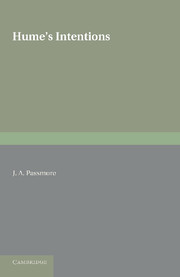Book contents
CHAPTER V - THE PHENOMENALIST
Published online by Cambridge University Press: 05 June 2016
Summary
‘Put shortly, Hume's object is to carry further the negative argument initiated by Berkeley, by showing that what we know is limited to a series of sensations, passions and emotions, together with mental images of them, and that it is groundless to believe in the existence of anything else, even ourselves.’ This quotation is from H. A. Prichard's Knowledge and Perception (p. 178), but the interpretation it presents is common to the majority of critics and historians. An insular trinity—Locke, Berkeley, Hume— ‘British empiricists’ all of them, with Hume, in Reid's words, presenting ‘the only system to which the theory of ideas leads, a system which is, in all its parts, a necessary consequence of that theory’—that is the picture of British philosophy which, until very recently, we have been invited to condemn or to admire.
Now, however, the accuracy of that picture has been seriously challenged. Kemp Smith has directed massive broadsides against the ‘Reid-Green’ interpretation of Hume, and these are beginning to have some effect upon the historians of philosophy. Russell, it is true, in his History of Western Philosophy still writes that ‘he developed to its logical conclusion the empirical philosophy of Locke and Berkeley, and by making it self-consistent, made it incredible’ (p. 685); and the influence of Russell's book will no doubt help to perpetuate the older view. But other writers, such as A. D. Woozley, push Kemp Smith's radical interpretation to a more extreme point. ‘Hume’, writes Woozley, ‘could have scrapped Part I entire and have substituted almost any other analysis of the objects of cognition without having to alter in essentials any of the arguments that follow. What was vital to his main theories was that our experience should be made up of a sequence of discrete particulars, but what the mental or material status of those particulars was, was not of much account.’
But ‘discrete particulars’, most assuredly, will not serve, if Hume's ‘main theories’ are those which he particularly emphasized.
- Type
- Chapter
- Information
- Hume's Intentions , pp. 84 - 104Publisher: Cambridge University PressPrint publication year: 2013



